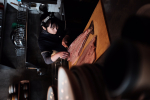Introduction
Seeing Hyphen magazine's call for pitches on “Hunger”[1], I immediately thought of my own frustration and inability to re-create flavors and food memories from my childhood. When I first left home for college in middle-of-nowhere-Ohio, I found myself craving memories of food I’ve long since forgotten: the sticky, chewy, stringy texture of a good-for-you/prosperous fungus my grandmother would make for Christmas and Lunar New Year. (I, of course, don’t know the name — neither Mandarin, nor Cantonese nor pinyin — and so, relying on my childhood memory, typed “Chinese lucky food hair” into Google images, in vain.) My parents and I have difficulty communicating beyond surface small talk, but talking about food — more specifically, our food — gives us an excuse to linger. Over 3,000 miles separate us; a gap we occasionally close with images or texts about food.
Recently, I received a battered copy of Yan Can Cook (1982) in the mail. A Cantonese food TV star (quite possibly the first and last), Martin Yan began starring in his own PBS show, Yan Can Cook, in the '80s. He grinned maniacally into the camera while hacking away at vegetables with his cleaver; he made cringeworthy Chinglish puns and made sure all his dishes were ‘exotic’ but not so ‘ethnic’ as to upset the Euro-centric narrative (an example of this: there’s a recipe for a “tapas”-like spread of Chinese-inspired small dishes in the book titled Oriental Picnic[2]). The entire book was so bad, I couldn’t look away. It was the equivalent of rubbernecking at your own people, its culture and history of perception in America. My mom, days later, asked if I liked it. How could I, made-in-America, complain about identity issues and micro-aggressions and tokenization, when she and her siblings and parents happily stowed away on boats and swam across rivers to stir mashed-potato mix at KFC and be spit on and ching-chong’d by their lovely, American classmates? “I love it,” I started to write back, but she beat me: “You got the book?! Wasn’t it a disappointment?! The recipes are not authentic!”
I’ve been thinking a lot about whether these flavors/memories even exist outside my memory. Every time I go back home to California to visit my grandmother, she’s cooking less and less and relying more heavily on Americanized ingredients and hyper-efficient/processed foods. This is because of her age, yes; but also it seems to be a huge luxury, a unique-to-our-generation hunger for the physical pleasure, and intellectual/cultural “experience” that food affords us.
recipe for disaster/tomato and egg
with finger on blade, “x”
marks the spot
at the tip
of each
tomato.
以卵击石 yi leun gik sek
with four stones, crack four eggs:
invite disaster by
overreaching yourself.
drag all this sleepily along
the floor
of the wok.
a crumpled handkerchief
of eggs beneath
sugared tomatoes
fish with grandma
cleave the ginger into
chocolate new year coins.
peel off the softer and
darker layers of green, and
with these, tie three or
four loose knots.
tenuously-bound
granny knots.
back from the market by then,
she will lay the fish over
your woven scallions.
you lift the belly, so she
can insert the coins
of ginger.
sweet soy spattered
and spooned
across unexpecting fish.
made in china / made in america
nature versus nurture:
do radishes come blushing into the world
or is it bled in?
you send me a book on
chinese cooking on
PBS in the
’80s —
complete with tutorials on
daikon chrysanthemums and
tomato angel wings and
seaweed rice rolls.
how are you,
you who swam through rivers to
sew your own thumb into a
pair of chinatown factory denim jeans
to understand my complicated
made in america
depression?
[1] See Hyphen magazine’s Finding Food Securities series
[2] Coral Lee and Dr. Jennifer LeMesurier discuss rhetoric and food, including the term “oriental,” on the podcast Meant to be Eaten on Heritage Radio Network










Comments